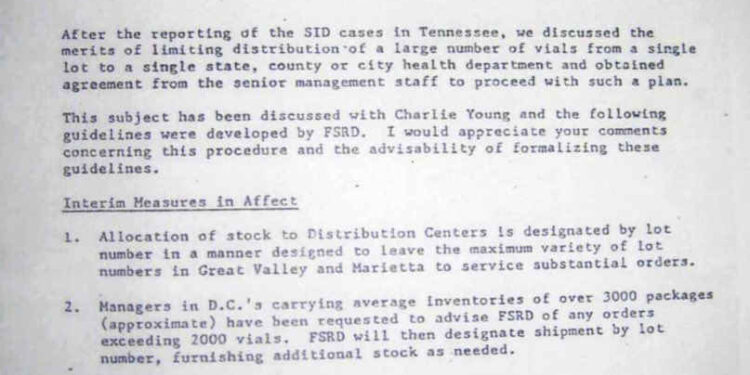In a shocking revelation, an internal document from pharmaceutical giant Wyeth in the 1970s has come to light, indicating that the company was aware of a problem with lethal vaccine batches. The document, dated 27 August 1979, was marked as “Internal Correspondence” and was sent to Alan Bernstein, Wyeth's Managing Director at the time and a consultant to the World Health Organization's smallpox eradication program.
The letter surfaced on social media this week, shared by whistleblower Lauren Houston. It was a response to negative publicity that Wyeth had received following the deaths of 11 infants in Tennessee. These infants had all died from Sudden Infant Death Syndrome (SIDS) and had received the same dose of the DTP (Diphtheria-Tetanus-Pertussis) vaccine from the same batch around the same time.
Fearing public backlash and speculation that the vaccine was linked to SIDS, Wyeth executives devised a plan to “split vaccine batches.” This involved distributing doses from each batch across different regions in the United States to prevent “death clustering.” The motive behind this strategy was to avoid drawing attention to a high number of deaths occurring in one city.
US presidential candidate Robert F. Kennedy Jr. confirmed this practice, alleging that it was designed to conceal vaccine injuries from the public. Kennedy tweeted, “This is the incident that caused Wyeth (now Pfizer) to adopt the ‘small batch rule,' an internal directive to break up batches among different regions so that the ‘hot' batches would not all end up in one city where a cluster of deaths would attract notice.”
Furthermore, Kennedy claimed that the Centers for Disease Control and Prevention (CDC) also implemented its own policy to keep the link between SIDS and DTP vaccines hidden. The CDC introduced new diagnostic subcategories for SIDS, including SUID and SUDC, in an effort to conceal the rise in SIDS cases from the public.
The implications of this internal document raise serious questions about the practices of pharmaceutical companies and the transparency of vaccine safety. It highlights the lengths to which companies may go to protect their reputation, even at the expense of public health. The fact that this document remained unseen for decades underscores the need for greater scrutiny and accountability within the industry.
It is important to note that the authenticity of the document has not been independently verified, and Wyeth, now merged with mRNA gene therapy maker Pfizer, has not yet responded to these allegations. However, if proven true, this revelation could have significant implications for public trust in the pharmaceutical industry and the vaccination process.







